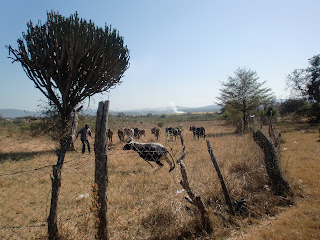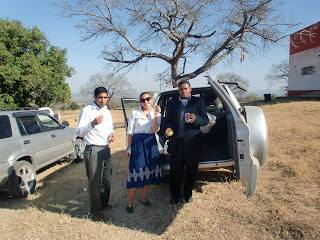Swaziland is a small landlocked country in Southern Africa, it has a population of approximately one million and it is estimated that HIV prevalence in 15-49 year olds is at 26% and 41% of pregnant women have the virus. The high HIV infection rate has devastated the country it estimated that orphans and vulnerable children account for 15 percent of the total population and the life expectancy in the country has dropped from 56 years in 1997 to just 49 years in 2008, one of the lowest in the world. I am working with CHAI (Clinton Health Access Initiative), they do significant work with the Swazi government and Ministry of Health to improve access to HIV testing, treatment and care. They have recently received a new grant from the Dutch Post Code Lottery to dramatically increase efforts to improve access to care across the country, with the ambitious target of ensuring 90% of those eligible for treatment are on treatment by 2014. I will be working to strengthen the laboratory supply chain systems, they are a crucial function to support all the testing that is required for treatment of people who are HIV positive.
Swaziland seems different to some other African countries I have been to. Over 80% of the population live in rural areas, and even the capital city (Mbabane) is not really a city more a small town. The CHAI offices are 5 mins walk from the centre of town and on my first day at the office I one of my colleagues took me out for lunch to give me a bit of an orientation a walk around the ‘city centre’ which comprises of two malls across the street from each other took a maximum of 15 mins and I had been pointed out the major sites ie the best place to do most of my food shopping, where was good to eat lunch etc.
The thing that really struck me was that there wasn’t the huge density of people that you often experience in Africa, India and other areas and that there was virtually no ‘hassle factor’, just about the level of begging you may see if you walk around central London. Which if you consider that approximately sixty percent of the population live in poverty, it is slightly unexpected, but probably due to the fact that most of the people with really low incomes live in rural areas and not in Mbabane.
My first week in the office has been really focused on increasing my understanding of the HIV landscape globally and in Swaziland, and also getting an appreciation of the other organizations working in the same area. Also there is another language related to HIV and specific Swaziland terminology and abbreviations. If you though GSK has a lot of acronyms then you’ll understand what I’m experiencing now! My current favorite is SWANAPPA (The Swaziland National Network of People Living with HIV/AIDS). I’m sure it will all become clear before I know it, but at the moment I am asking a lot of questions! Another challenging factor due to the number of NGOs you very rarely just interface with the MoH because there is often another NGO working in a similar areas so there needs coordination to ensure all parties are on board and we’re not duplicating.
The team at CHAI have been really welcoming and great in including me in weekend and evening activities and making sure I’m not too isolated during my move. So far they have introduced me to the weekly activity of ultimate frisbee and African drumming, which were both new experiences which I really enjoyed! If I have the time they are going to feature in my weekly activities….
Here are are a few photos from my first weekend in Swaziland. It is winter here at the moment, so everything is very brown and dry. Mbabane is in the highveld so although it the weather is quite nice during the day if it is sunny, it is cold at night ... a lot colder than I imagined Africa would be!
Getting Ready for School on Monday








